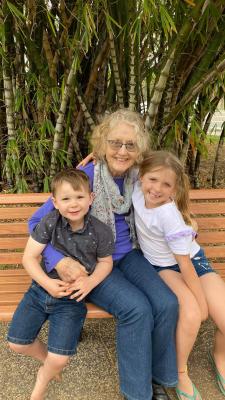In 1971 at age 32 Heather Rutherford was diagnosed with breast cancer. But the Beerwah resident, now 83, has seen her two sons grow up and has five grandchildren and four great-grandchildren, after surgery and radiation therapy successfully removed the cancer.
In the final week of Breast Cancer Awareness Month, Heather is sharing her tips for living well beyond a cancer diagnosis, and her experience of the life-changing treatments being offered by Buderim-based Bloomhill Cancer Care, where 315 women with a breast cancer diagnosis currently receive care.
For Heather, finding a way to manage a common side effect of cancer surgery, lymphoedema, was central to her quality of life.
More than 10 years after surgery, Heather noticed one arm was larger than the other, and the swelling got worse and painful. Her clothes stopped fitting. The condition of lymphoedema was little known in the 1980s, and she struggled for eight years before finding any help that worked.
“For some time, I had a hook in the ceiling above my bed, I wore a big shirt and I was sleeping with my arm elevated like that, hanging from the ceiling. Compression and elevation were the remedies, I was told – but found out later this was very bad for my condition. It was desperate times,” she said.
As science caught up with the condition and treatments became more effective, Heather was involved in various therapies, but said manual lymphatic drainage by a specialist massage therapist has been the most effective. The use of a Lympha Press to mechanically aid the therapist with a sequential peristaltic motion had been a great recent addition to lymphoedema clinics.
“I now go to Bloomhill and I have specialist massage every month to manually drain lymphatic fluid from my problem arm. It just keeps on top of it for me,” Heather said.
“It’s very specific therapy and we’re extraordinarily lucky to have it on the Sunshine Coast.”
Asked what her message for others going through a cancer diagnosis would be, Heather said simply: “Don’t give up”.
“The most important thing is that people have hope, they can see light at the end of the tunnel,” she said.
“It’s daunting being told you have cancer. But nowadays the information is there and the support is there, when it wasn’t years ago. There is help.”
“Lymphoedema develops due to a blockage or breakdown in the body’s drainage system (the lymphatic system) which causes a build-up of fluid,” Bloomhill therapist Debbie Myers said.
“It can develop within days, weeks, months or even many years after treatment for cancer more commonly in the arms and legs, but can also occur in the neck, face, chest wall, upper and lower body.”
Bloomhill offers a range of services that support individuals and their loved ones when faced with a cancer diagnosis.








